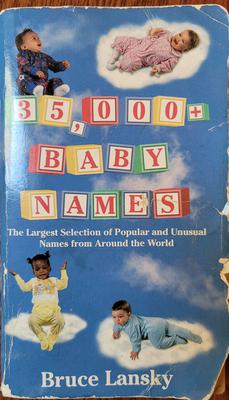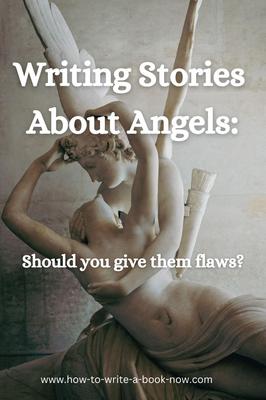Choosing Fictional Names
by Jasmine
(miami, florida)
Question: When trying to write a novel, the thing that gives me the most trouble is picking names. Names of people, names of places, names of ANYTHING. Do you have any advice to help me work through this?
Answer: Sometimes character names don't matter a lot and you can just randomly pick surnames from a phone book and first names from a baby name book. Just make them distinct from each other.
Here are some tips for when the names do matter:
1. When you want the name to say something about the character, you might look more closely at books/websites about baby names, because some will tell you what the traditional meanings of names are. You can just choose a name that reminds you of one quality your character embodies. This makes it easier when you're writing the story because the character name will remind you of their personality.
2. If your character's ethnic origin matters, you can check the ethnic origin of names at these sites too.
3. If you want your characters' names to seem authentic to a period, you can also look up what names were most popular in the year the characters were born. Names go through periods of popularity. The names that are common among today's eighth graders are different than those common among their grandparents.
4. If you're writing about aliens or fantasy characters, you may have a tougher problem of having to invent names from scratch, and make them reflect the right culture. See below for more on this.
As for place names, places are sometimes named for geographical features or events that happened there - in the language of the inhabitants at that time - or famous people (saints, kings, etc.). That can take some research if you are writing about a European village. North American towns are often named after European places (New York), the settlers who founded them, names taken from first nations names (Medicine Hat, Ottawa) or even concepts (Hope).
Again, it's easier if the name of the town doesn't matter. You can look at places on a map of the region your story is set in and invent something similar. If the name does matter, you just have to do a little research until you find a name that fits with the character of the place you are writing about.
If you're completely stuck for a name for something, consider just putting in a place-holder name with the intention of changing it later. Sometime the right name will just come to you after you've written a bit more.
Comments for Choosing Fictional Names
|
||
|
||
|
||
|
||
Naming Characters After Characters in Other Books
by taylor
(oklahoma)
Question: I'm having trouble deciding on a character name. I really like unique names, but some of my favorites (such as Ever or Haven from Evermore) are already taken by other authors. I don't want to copy names from people who originally thought of it first, but I don't even know where to begin thinking about original names. Is it okay to copy some (but mot all) character names from other authors? Will it be considered plagiarism if I do? Please help me!
Answer: The real risk in using names of very well known characters is not that you will be accused of plagiarism but that your readers will recognize them and your work will seem less original. Of course, you are free to use any common name in the phone book without such risk, but don't think you can give a character a name like "Sherlock Holmes" or "Lady Gaga" without everyone raising an eyebrow.
Your best bet, assuming you are writing fantasy, is to create original names yourself. In addition to the phone book, you can get ideas by thumbing through a dictionary, a "Baby Names" website (perhaps change the spelling of some traditional but rare names), or perhaps by looking at some very old genealogies.
You will also find random name generators on the web, some of which are geared towards fantasy. I would suggest you not use the names these generators produce without changing them a little to fit the world you are creating.
In the end, you want names that resonate with you - names that, in your mind, could only be associated with your unique characters. So your best resource is really your own imagination.
Comments for Naming Characters After Characters in Other Books
|
||
|
||
|
||
Finding Good Names for Fantasy Characters
by shelley reinhard
(manistee,mi,u.s)
Question: I'm having trouble naming my characters. I want something unique and different. Any advice would be much appreciated.
Answer: If you want an unusual name, but still one that is traditionally a name in some culture, you might try baby name sites or random name generators (the Scrivener software program for writers has a good random name generator).
If you want a totally unique name, perhaps for a fantasy culture, you might try ...
1. Taking real names and spelling them in unusual ways.
2. Taking real names and swapping a few consonants. (Or do the same but with vowels.)
3. Taking real names and swapping some of the syllables with other names.
4. Look for really old names in historical documents -- 1,000-year-old names, for example. Then change them a little as in #2 or #3 above.
5. Take unusual surnames from a phone directory and make them into first names.
Comments for Finding Good Names for Fantasy Characters
|
||
|
||
|
||
Do Character Names Need to Mean Something?
by Uchiha Sasuke
Question: I'm really picky about character names, because there are not that many names that I really like. Anyway, I was wondering, is it OK if your character names are simply names that you like, or do they have to represent/mean something?
Answer: Everyone has a different approach on this issue.
Sometimes, when it doesn't matter to you, you can simply pick a name from a random name generator or a phone book. Names don't have to mean something.
On the other hand, many writers prefer to choose names that symbolize something about the character. They may look up the traditional meaning of various names until they find one that captures the character's essence. Or they may choose a name that, to them, sounds like the character. Sometimes too, you may want a name that reflects the character's culture or ancestry (e.g. family names passed down, traditional names for a given country of origin).
Choosing names that appeal to you imposes another type of filter which is equally valid. If all the names are consistent with your feeling about the story and the story world, that can help create a particular atmosphere.
Another issue that may or may not matter is the character's age. Many names will become popular for a while, and then fade from popularity, perhaps to become popular again for another generation. As a result, a typical group of 12-year-old girls in the U.S. today, would likely contain a Madison, an Emily, and a Hannah (and perhaps more than one). On the other hand, a group of 70-year old women would be more likely to include a Mary, a Barbara, and a Linda.
Some baby name websites will tell you the most popular names for a given year, along with their traditional meanings and cultures of origin.
More on Fantasy Character Names
by shelley reinhard
(manistee,mi,u.s)
Question: I'm having trouble naming my characters. I want something unique and different any advice would be much appreciated.
Answer: If you're writing fantasy, you might try looking at names from other cultures and just altering the spelling (some baby names sites are good sources of ideas). Or you could try looking at historic genealogies for names that have fallen out of use centuries ago.
There are also fantasy name generators used by gamers, but they often produce names that sound artificial.
If you're not writing fantasy but just want an exotic or unusual name, many baby names sites let you search for names by popularity or nationality (just look for the least popular).
You Don't Want Just Any Name for a Character?
by Tasmiah
(State)

Baby Name books can be bought inexpensively secondhand and can help you find good names for book characters.
Question: How am I supposed to come up with a name for my characters because I don't want just any name? I need a name for a male and a female. Any suggestions?
Answer: There are some suggestions for finding character names on this page and in this article...
https://www.how-to-write-a-book-now.com/create-characters.html
If you don't want to just pick a name at random, then the best sources for first names are the "baby names" websites. These are created for expectant parents and often tell you the meanings of different first names and their ethnic origins.
You can also google a list of popular baby names for any given year or perhaps decade, to make sure, for example, that your 80-year-old characters aren't sporting names that make them sound like the class of 2010.
Surnames are more difficult. It's fairly easy to google a list of common surnames for a particular nation - if ethnicity matters in your story. (If ethnicity doesn't matter, you can get ideas from a phone book.) After that, you may need to look up each surname that sounds appealing to you on a genealogy site to find its meaning.
Of course, you can also make up names, which you might want to do if you're writing fantasy or science fiction. In that case, you're free to decide what the names mean in their native language, or use onomatopoeia (make the sound of the name suggest something about the character).
Comments for You Don't Want Just Any Name for a Character?
|
||
|
||
|
||
|
||
Creating Original Character Names
by casimir
(amherst,newyork)
Question How do I come up with names without using ones that have already been used or sound like real people?
Answer: I take it you're writing fantasy and want names that originate in a made-up culture? Most names in the real world are constantly being reused and duplicated.
One approach is to consider what sounds you want your culture's language to be based on. For instance, Italian sounds very different from Gallic or Japanese. You can take the flavour of a given culture - the sounds, rhythms, etc. of the language - and apply to them to your fantasy culture. You can take traditional names from a given culture replace certain consonants or vowels, or alter the spelling a little, to create original names.
Alternatively, you might look at names that were common in ancient cultures that few people would recognize today.
Of course, the other option is to just make them up.
Comments for Creating Original Character Names
|
||
|
||
|
||
|
||
Re-Naming Characters Based on Real People
by Barbara
(Gualala, Ca. USA)
Question: I wrote a novel based on something that happened to me. I named the characters by their real names. Am I supposed to give them fictitious names?
Answer: The risk of using the names of real people in your book is that some of the people might take objection to your portrayal of them.
Most serious is if the book could be considered defamatory. I'm not a lawyer, and cannot give legal advice, but my understanding is that if you damage someone's reputation in a way that negatively affects their income, you run the risk of being sued.
Legal issues aside, there is the risk of creating enemies who might retaliate.
You say this is a novel, not an autobiography, which means you have fictionalized the real events and changed many of the details already. In keeping with that, you should probably fictionalize the characters as well.
Changing the names is just the start. For instance, it is often safer to change some of a character's traits so that it is not recognizable as the real person on whom it is based. You can also combine traits from several different people to create a fictional character who is unique.
It's just safer in the long run.
When a Character Goes by More Than One Name
by Holly
(Winston Salem)
Question: My protagonist has a first name, a nickname that only his wife and friends use, and an army title used by the guys in his force. I'm struggling with which name I should use at what time and if it would be too confusing for the readers. If I were to only use his first name in the actual writing, and use the other two only in dialogue when he is being addressed, would this be okay?
Answer: Yes, I think you are on the right track. It's important that the narrator consistently refer to a character by the same name so that the reader doesn't get confused.
Generally, the narrator (or narrative voice) will use a character's name far more often than it will appear in dialogue, so if another character occasionally refers to your protagonist by his proper name or title, the reader should be able to deduce what's going on (but do provide sufficient clues).
The name the narrator chooses to use for the protagonist does make a difference. If it's the first name, that helps to put the reader a little bit further into the protagonist's point of view (as in third person limited narration). The surname, on the other hand, is a little step closer to an omniscient point of view. It's more like the narrator is looking at the protagonist from a slightly greater distance.
Odd or common name?
Question: I've been wondering for a while--with a fantasy in which there's a different world from ours, would it be better to have common or odd names? Common would be stuff like Sarah, Will, Jack, etc.
Odd would be like Legolas, Aragorn, or Hadrid. Which would be better?
Answer: There is no right or wrong answer here.
Some writers prefer to use common European names in a fantasy world that resembles Europe, or Europe in the past. (Of course, the names that were common in, say, Medieval Europe would sound quite strange today.)
You might also look at non-European cultures for inspiration - provided they make sense in your story world.
Some writers prefer names that distinguish one culture in the story world from another. For instance, choosing fantasy names for a fantasy race such as Elves.
And some writers take a middle path by taking common names that today's readers would find easy to pronounce but spelling them differently or changing a few of the consonant sounds.
In the end, you just have to choose names that resonate with you, that seem to fit your vision for your story world and that make sense in the context. Maybe you would find it weird to call your dwarf character Trixiemixie, but Bert feels right to you, even if it's a human name. On the other hand, Lady Macbeth's wife was actually called Gruoch, which sounds to me like a great name for a lady troll.
Best of luck.
Should I change my character's name because my new colleague has the same name?
Question: I've been writing a novel for a while, but recently, I met a new colleague who has the same first name as the male protagonist. It's really weird and I'm considering whether I should change the male protagonist's name.I'm not worrying about legal problems, but I do worry about what other people around me would think.
On one hand, I believe that fiction is fiction, and there's only a very limited number of names in English. That name is a common name and there's probably millions of people in the world who has the same name. Even if I changed it to something else, it is inevitable to have other people with the same name.
But on the other hand, it could be awkward because it seems like he's the only one I know who has this name. Imagine if one day you find out that a woman you know writes a novel with a hero who has the same first name as you, and that character eventually ends up with another character who's probably based on her (though with a different name), what would you think?
Should I change that name? or not?
Answer: As Shakespeare said...
"That which we call a rose, by any other name, would smell as sweet."
Changing the name is a relatively easy and painless way to avoid awkward conversations or misunderstandings. After all, if your book gets published, you might spend years explaining to other people that you didn't borrow your colleague's name -- and the colleague might not believe you.
Of course, this sort of situation happens. By one account, Harry Potter was the name of one of J.K. Rowling's childhood friends. So sometimes it's just fine.
On the other hand, if your character is a pedophile or an axe murderer, and your colleague by sheer coincidence gets suspected of committing such a crime, the damage you may have caused his reputation could come back to bite you. Even if your character is merely dislikable, lies to his wife, or acts in any immoral or unethical way, offense could be taken.
Changing the name is just plain safer.
Comments for Should I change my character's name because my new colleague has the same name?
|
||
|
||
Deciding the name of two of my main characters that relate to the time era they are in.
by Brandon
(Upstate NY)
Question: I am writing a story that revolves around one little girl; Faith. She is an important girl who has gone missing from one of the main 6 cities of the world of Cambiar. (To Change)The ruler of this city; Warrick, hires two of the main characters after they impress him with different skills that they have. After they find Faith they immediately connect with her.
I am having a problem trying to come up with the name of two of the main characters (One male and one Female) that relate to the time era they are in. I don't where to begin with this. I want them to be in an Age with Steel but before anything with guns. It is a time of limited Magic.
I know my question is confusing, but it would be great if you can help me and even give advice.
Thank You
Brandon K.
Answer: Here are three options ...
1. You try one of the fantasy name generators found on the web (not to copy the names it produces, but just to get ideas you can turn into something you like better). (This is probably the lamest option.)
2. You do some historical research to see what names were popular or existent around the equivalent time in real world history and choose two of those or something that sounds similar. It sounds like the names in your world are drawn from English history, which narrows it down.
3, You write about the characters for a while and see if they name themselves. I know that sounds odd but it actually can work quite well.
Comments for Deciding the name of two of my main characters that relate to the time era they are in.
|
||
|
||
For two different books can the main character have the same name?
by Marissa
(Cincinnati)
Question: Ok so I have ideas for two books and when I create the characters my main character has the same name and I've tried to change it but I just don't feel like any other name works for either character and well the books are kind of similar and the characters are too but they are also completely different and have been through different things so is that a problem? Do I have to change the name of one of my main characters or is it ok that they have the same name?
Answer: The risk you run is that if two books, by the same author, have main characters with the same name, readers may assume both books are about the same character. This will lead to confusion and disappointment if the characters are in fact different.
Consider, if you read a mystery novel about Sherlock Holmes by Sir Arthur Conan Doyle and you loved the character of Holmes. Then you see there's another book by Doyle also about Sherlock Holmes. You buy it because you want more of that character. But if it turns out the second Sherlock Holmes is a completely different character, you will be disappointed. You might never buy another book by Doyle.
Characters that are successful are like brands. They lead to more sales, but only if they are consistent. Inconsistency in this area will not help your career.
So I suggest that you find a different name for one of the characters. If you are lucky enough to sell both books to a publisher, the publisher will probably insist that the characters have different names, for the above reasons.
You may feel now that only one name works for both these characters, but I will suggest that you have not fully considered all other possible names. Look a little harder, and I suspect you will stumble across a name that fits one character and not the other.
In addition, giving the two characters different names will help prevent you from getting the two characters confused, which will help prevent the traits of one from bleeding into the other.
Comments for For two different books can the main character have the same name?
|
||
|
||
|
||
|
||
|
||
|
||
- Home
- Character Questions
- For two different books can the main character have the same name?

















